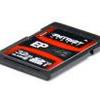Specs adn preliminary testing
With the summer holidays in mind we wanted to review this product. The Patriot Memorys EP Pro SDHC/SDXC delivers transfer speeds of 90MB/s (read) and 50MB/s (write) and have capacities up to a whopping 128GB, yeah embedded on a little card the size of a postage stamp.

That is nearly 5x the transfer speeds of standard SDHC cards, when used with UHS-I compatible devices, the EP Pro SDHC/SDXC provides the high performance necessary for professional high definition multimedia content creation.
Feature Set:
- SDXC UHS-I Class 1, SDHC Class 10
- Read and write speeds of up to 90 MB/S (read) and 50 MB/S (write)
- Capacities: 16GB, 32GB (SDHC) 64GB, 128GB (SDXC)
- Class 10 compatible
- 5-Year Warranty
So remember that 'normal' UHS-I cards typically have a maximum 60MB/35MB/s ceiling. However, a device needs to support the UHS interface in order to realize the quoted speeds; the card defaults to a Class 10 SDHC in non-UHS-I-approved cameras and camcorders.
The performance is easy enough to test as there is many software available that can measure sustained bandwith, we'll simply grab a USB 3.0 port with a USB 3.0 card reader attached to it, which will show maximum throughput combined with the right software stress tests.
So how fast is it ?

That's impressive performance from a SDHC carted right there. In the chart above I have added two other results, a cheapo class 6 rated card from SanDisk, a slightly more expensive Class 10 card from ADATA and then the new Patriot SDXC UHS-I Class 1slash SDHC Class 10 card.
As you can see read performance is nearly 30% slower then advertised performance, which is curious. however the 73 MB/sec remains dauntingly fast. Write performance is advertised at 50 MB/sec, we reached 46 MB/sec so that is just good. Compared to a class 10 SHDC card that's 3 to 4 times the read performance and a good two to two and a half times on write performance.
You can see from traditional Class 10 cards that the performance bump is really significant, but before making any conclusions, let's fire up some more benchmarks.

